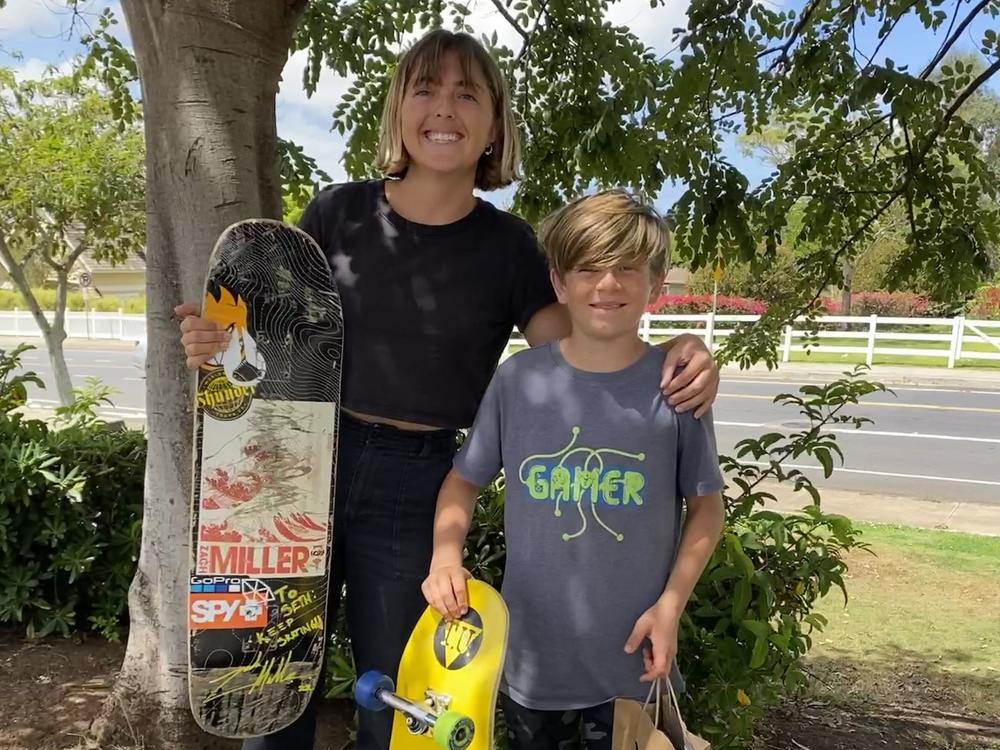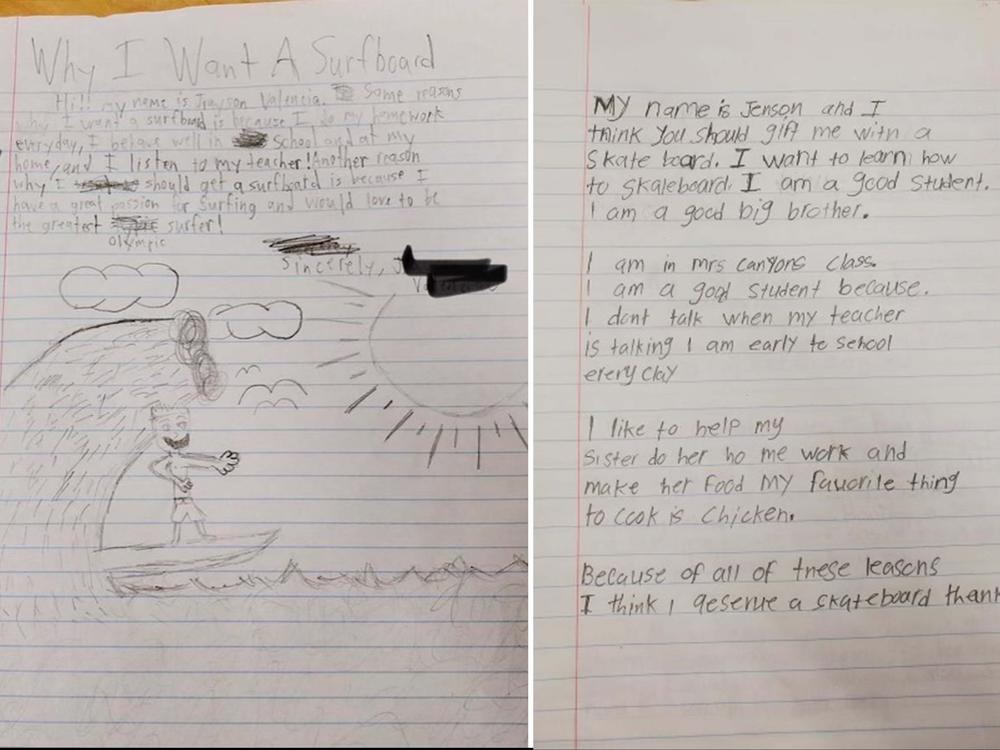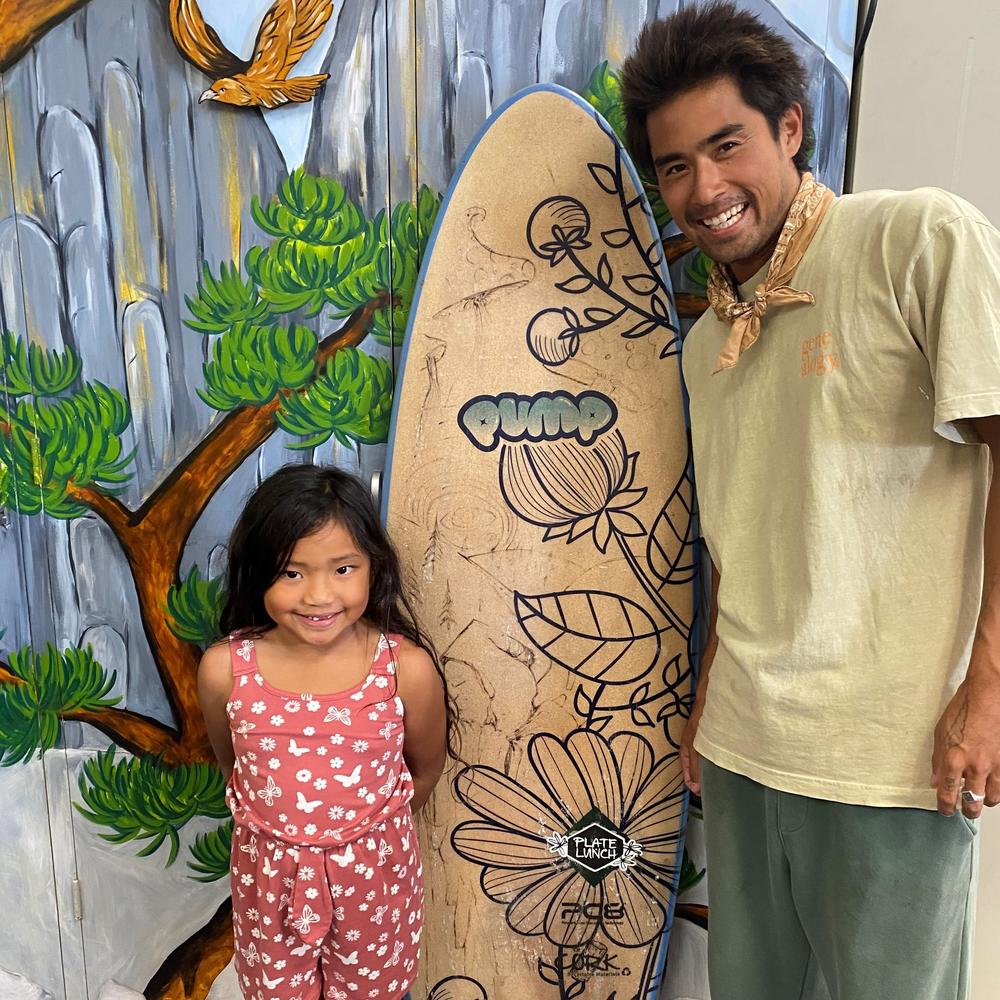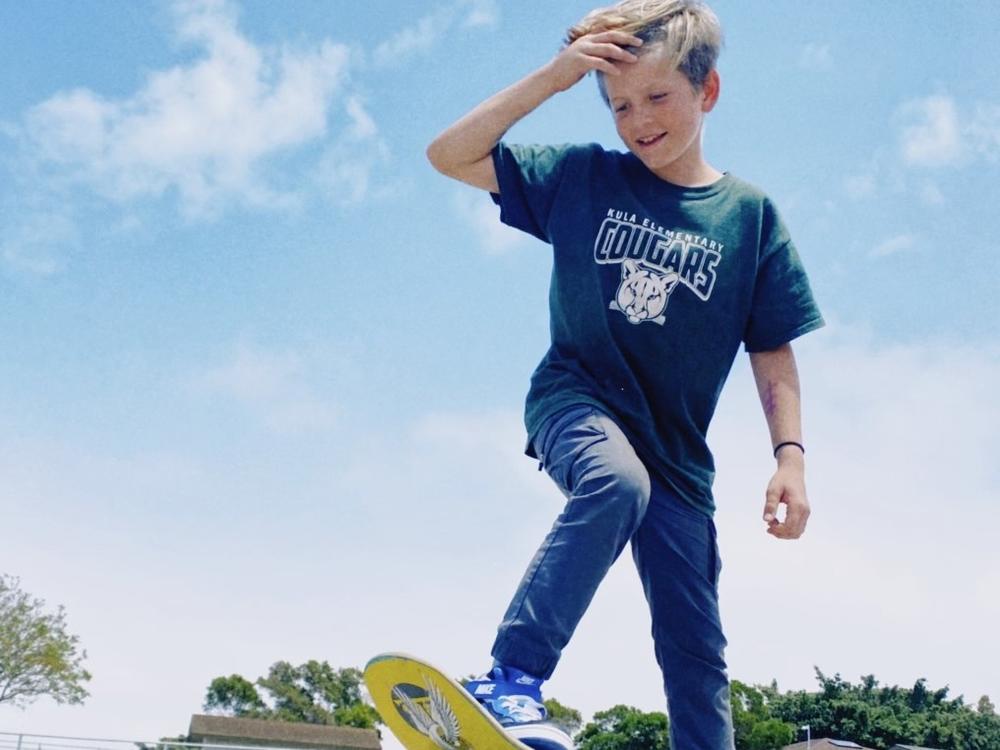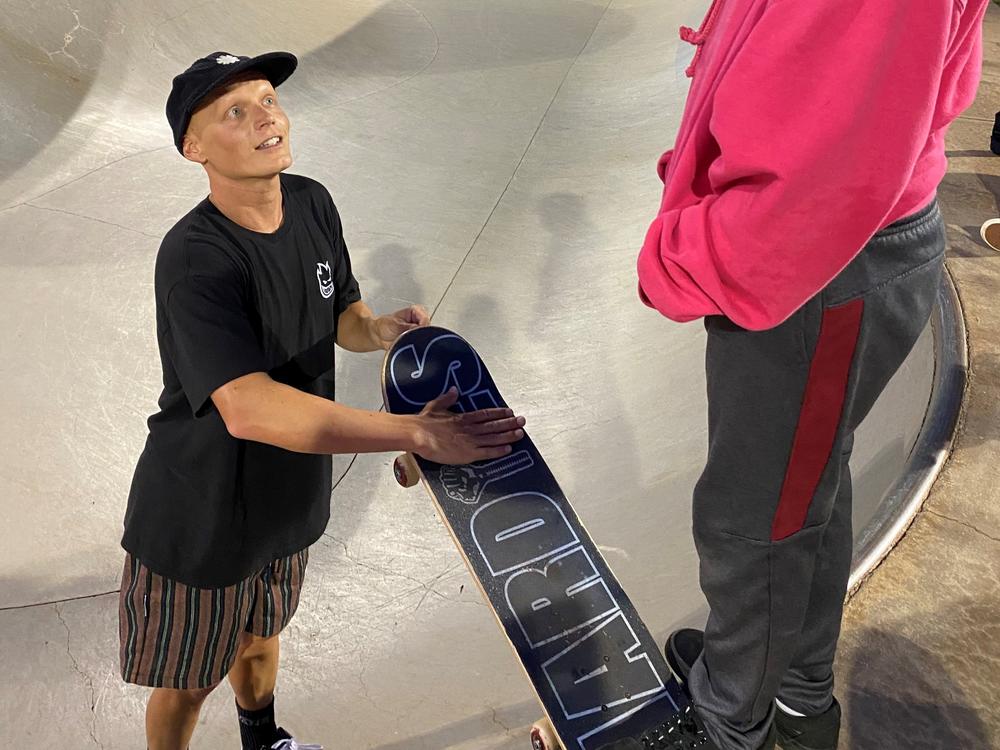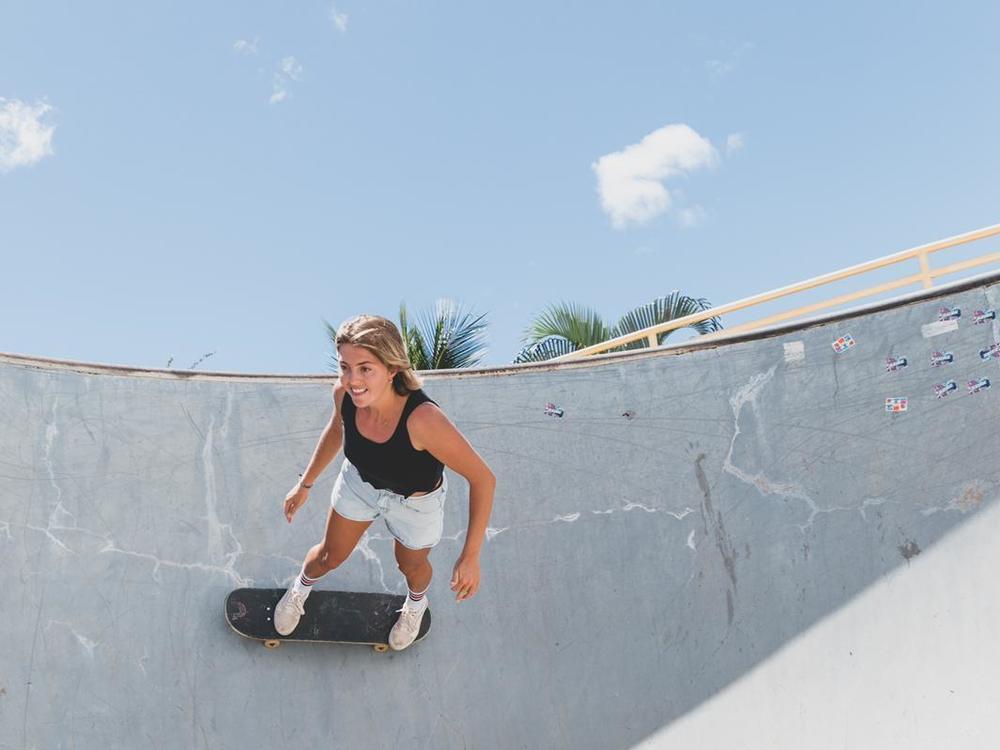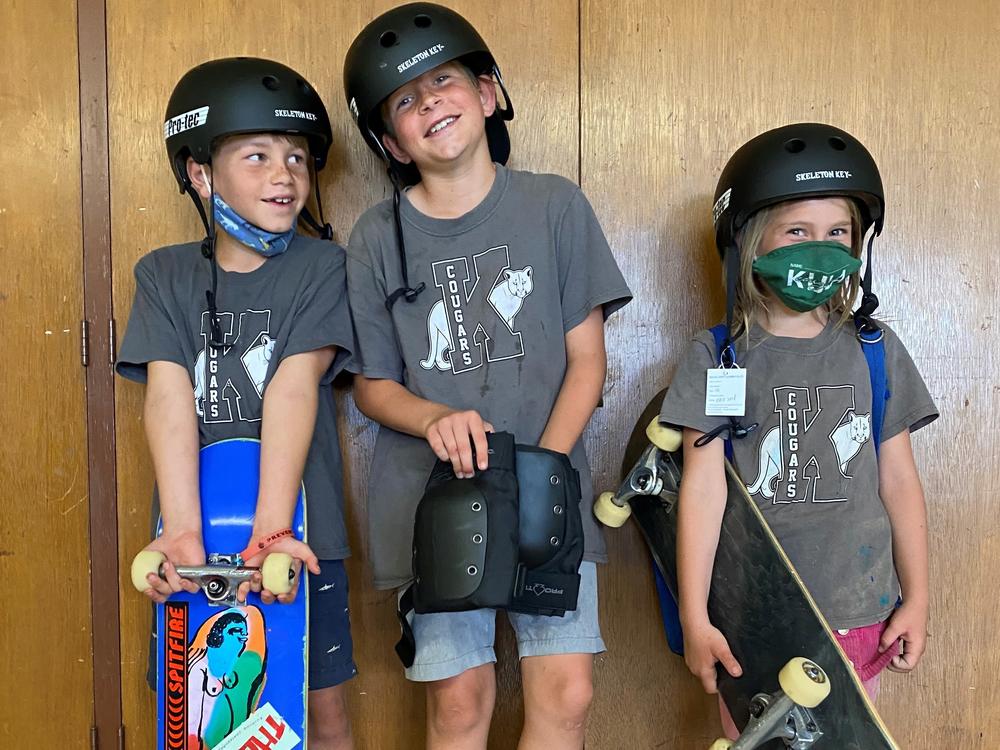Section Branding
Header Content
A teacher in Hawaii is rehoming surfboards and skateboards to underprivileged kids
Primary Content
Brit Oliphant and her boyfriend, Nic Hibdige, boarded a puddle-jumper flight from Maui to Oahu in late April on a mission to share positive vibes with a handful of kids from underserved communities.
They traveled the Hawaiian island collecting used surfboards and skateboards from donors who were happy to see their unused equipment in the hands of kids who, more often than not, were unable to afford a board of their own.
The first stop was Kahuku Elementary School on Oahu's world-renowned North Shore, where Brit had worked as a student-teacher four years earlier. The next stop was Fern Elementary School just outside Honolulu, where teachers asked students wanting a board to write a brief essay on why they should get one.
"I like to help my sister do her homework," wrote one student. "I have a great passion for surfing and would love to be the greatest Olympic surfer!" wrote another.
Brit and Nic were able to deliver five skateboards and nine surfboards on behalf of Boards 4 Buddies, Brit's grassroots organization geared toward putting surfboards and skateboards in the hands of underprivileged children. In just under three months since the program's conception, Brit has managed to rehome more than 50 surfboards and skateboards, a quantifiably minor accomplishment to all but the kids whose lives she has improved.
"I was so happy to see how stoked they were when we went into the school with all the boards. All the credit goes to Brit, though," Nic said. "She is an amazing teacher and person, and to see her helping kids in and out of school is inspiring to me."
Boards 4 Buddies is, at least for the time being, just a passion project. Brit works full time as a fourth-grade teacher at Kula Elementary School. It was there that she met Seth Snyder, a student who had flown under the radar with previous teachers.
A connection through skateboarding
Every year, Brit is given a nine-month window in which to connect with a group of new students. And with each batch of new students, she hopes to have a positive impact on their lives. But Seth was a tough cookie to crack. For the first few months of the school year, she struggled to connect with her student, who was bashful but nevertheless a pleasure to have in the classroom.
One day, Brit showed her students a clip of skateboarders going all out at Tony Hawk's ramp in California.
Brit glanced over and watched Seth's face light up; she found their connection. From that moment onward, almost every aspect of Seth's education, from English to economics to creative writing, was tied into skateboarding.
"We made business plans to kind of teach them a little economics lesson, and he designed Seth's Skate Shop. He wanted a mini-ramp in his shop, and he listed all the things he was going to sell and what his profit was going to be," Brit said. "That was the hardest I've ever seen that kid work."
Brit is an idealist, a "glass half full" kind of woman, when it comes to her students. She knows that not every child is going to be ecstatic about math, science, writing or other parts of the required curriculum. But that's OK, she said. She's more concerned that they learn to be good people.
"I want them to have compassion and empathy and care about each other," she explained. "I think it's more important than ever to give them those life skills and those social skills and opportunities to work as a team and to overcome hard things, because that's life, you know? Life isn't always easy."
Building a bond
Although Seth continued to open up with each passing week, Brit sensed something else was going on. She went one step further to connect with Seth by inviting him to join her at the skate park after school one day. Instead of excitement, Seth shut down. He politely declined his teacher's offer and withdrew once more.
In spite of that, Brit wouldn't be deterred so easily. She asked again a few weeks later, the day Seth and his fellow students were cut loose for spring break.
"What are you going to do?" she asked. "Are you going to skate?"
"No," he mumbled, almost embarrassed. "I don't have a skateboard."
Brit's heart sank into her stomach as her foot sat uncomfortably in her mouth.
Kula Elementary comprises mostly underprivileged students who come from low-income families. Teachers like Brit have to tread carefully when it comes to even the smallest conversations or assignments, because a question as innocent as "What are your plans for spring break?" can be hurtful, sometimes embarrassing, for students who have so little.
"It just didn't cross my mind that he could love skateboarding so much and, you know, have skateboarding be the light of his life and [he doesn't have] his own," Brit said. "If your parents are working three jobs to be able to pay rent, of course they're not going to have time to take you to skate park or, you know, take you surfing, or let alone buy you that $400 surfboard or $200 skateboard."
The birth of Boards 4 Buddies
Despite her best efforts, Brit beat herself up as she traveled from Maui to Encinitas, California. She was excited to spend her spring break surfing and skateboarding with friends, but her mind frequently wandered, revisiting her last conversation with Seth.
While in Encinitas, she shared Seth's story with Zach Miller, one of her best friends who also happens to be a professional skateboarder. Seeing an opportunity to help a child's dream become a reality, Zach offered to send Brit home with a few presents for Seth: a used pro-model skateboard, signed by Zach and professionally ridden by him, for Seth to hang on the wall at home; a new board for Seth to ride until the wheels fell off; and a letter.
"It is amazing where skateboarding can take you in the world," Zach wrote. "Skating will make you feel better in hard times and make good times even better! Never be afraid of others skaters either, we are one family!"
What began as two people coming together to do a good deed for one young boy quickly blossomed into a grassroots effort, Brit said. Zach would collect used equipment — surfboards and skateboards, leashes, fins, helmets, kneepads and more — at his brick-and-mortar shop in Encinitas, the Social Surf Club, and ship the donations to Hawaii for Brit to hand out to the kids.
And just like that, Boards 4 Buddies was born. It was almost too easy, Zach explained, because he and his friends, many of whom are professional skaters, surfers and snowboarders, are always looking to give away gear but don't know where to find a kid in need.
"I don't have extra money to just throw at stuff. What I do have is a ridiculous connection to free resources of equipment, skate and surf equipment, that your average person does not have," Zach said.
Lessons learned
Unlike Seth, Zach was born into the surf and skate scene. His dad, Chris Miller, was a pro skater in the 1980s. The skate park at the Encinitas YMCA often doubled as a day care for Zach and other grommets in their younger years. Zach and his band of buddies grew up surfing and skating most days until the sun went down, a life radically different from Seth's.
Brit had a similar upbringing in Bend, Ore., where she grew up skiing, snowboarding and surfing. Skating came later when she was in college in what she described as "late adult-onset skateboarding."
But board sports are more than just an after-school activity or a way to pass time, Brit and Zach explained. They can provide a much-needed break from reality.
"Skateboarding can be super-therapeutic, and it can be an escape," Zach said. "It gives you an outlet that requires very little money, very little resources, and it's all to you. You don't need a team. You don't need a field. Once you have a skateboard, you're good. ... You can physically transport yourself."
As for Brit, she sees skateboarding as another one of life's classrooms. She said she wishes she could take her whole class to the skate park so they could see how others overcome their fears to achieve their goals.
"I think that's like the best social-emotional learning you could ever give a kid," Brit said. "Just like, fall down, get up, try again, help others and just skate and have fun, you know. That's something that's really hard to teach through, like, a picture book or a social-emotional lesson."
Boarding into the future
Seth eventually let his guard down and took Brit up on her offer. The two have since spent many afternoons skating together, Brit said, and she loves to see Seth progress. Before the school year came to a close in late May, Boards 4 Buddies found two boards for Seth's younger brother and sister so the three can spend the summer skating together.
Brit and Nic took a much-needed vacation to Europe after the school year ended, but even then, they had their business hats on, brainstorming about the future of Boards 4 Buddies.
The dream, Brit explained, is to connect with other teachers and board shops across the U.S., not just in California and Hawaii. There is no shortage of kids who would benefit from the program, but shipping boards and gear is expensive. Brit and Nic have paid hundreds of dollars out of pocket to keep the program afloat, and they are several thousand dollars short of the lawyer fees and application cost of securing their nonprofit status.
Nevertheless, they remain determined. They've seen the impact Boards 4 Buddies has had on kids — and many parents — and have no intention of stopping anytime soon.
"We really want to get to the point that we can go to communities and build mini-ramps, spots for kids if they don't have a park," Brit said. "We're going to make it happen, we've got big dreams and we have the right people on our side."
Copyright 2022 NPR. To see more, visit https://www.npr.org.
